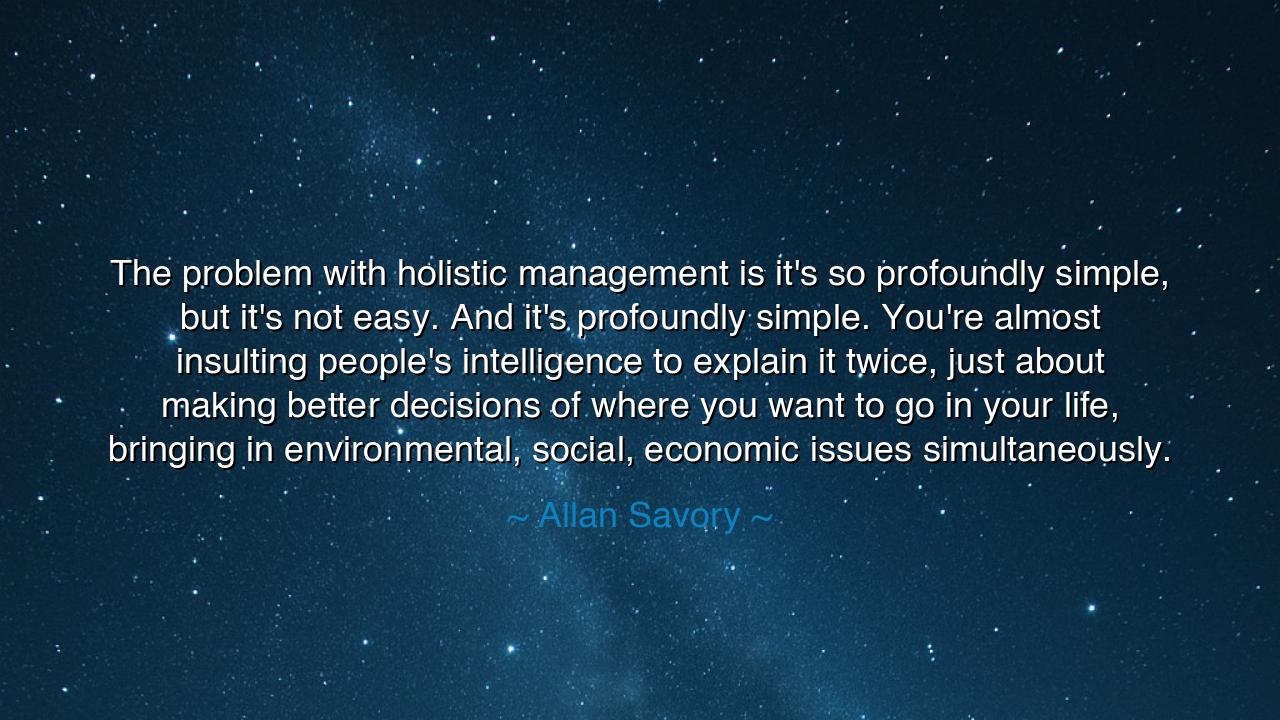
The problem with holistic management is it's so profoundly
The problem with holistic management is it's so profoundly simple, but it's not easy. And it's profoundly simple. You're almost insulting people's intelligence to explain it twice, just about making better decisions of where you want to go in your life, bringing in environmental, social, economic issues simultaneously.






Hearken, children of wisdom, and attend to the words of Allan Savory, a seeker of balance in a world of complexity: “The problem with holistic management is it's so profoundly simple, but it's not easy. And it's profoundly simple. You're almost insulting people's intelligence to explain it twice, just about making better decisions of where you want to go in your life, bringing in environmental, social, economic issues simultaneously.” In this insight lies a truth that echoes from the earliest teachings: simplicity in principle does not imply ease in practice, and the art of life demands integration, foresight, and courage.
Since time immemorial, philosophers and leaders have struggled with the challenge of holistic thought. The ancients taught that to live well is to consider the whole: the self, the community, the land, and the cosmos. Yet knowing this truth does not make its practice effortless. Savory’s insight reminds us that while the principle is simple—consider all dimensions of life in decision-making—the discipline required to act upon it is formidable. The mind may grasp the theory, but the heart and will must labor to embody it.
The essence of holistic management lies in awareness and integration. Every decision is connected: where we dwell, what we consume, how we relate to others, and how we honor the natural world. Neglect one element, and imbalance arises; embrace all, and harmony emerges. Savory emphasizes that while it is simple to state—bring together environmental, social, and economic factors—the challenge lies in execution, in translating awareness into consistent, purposeful action.
Consider the example of the ancient Chinese emperors who oversaw both the land and the people. They understood that governance required attention to harvests, taxation, public health, and social harmony. Failure in one domain could reverberate through the others, creating calamity. Likewise, Savory teaches that decision-making in life is not isolated; the profound simplicity of holistic management demands vigilance, observation, and adaptation across every sphere of influence.
Even in modern contexts, Savory’s lessons hold. On degraded grasslands of southern Africa, he demonstrated that thoughtful management of livestock, land, and water, considering ecological, economic, and social dimensions together, could reverse desertification. The principle was simple: rotate herds, restore soil, and balance human needs with environmental stewardship. Yet the practice required observation, patience, and relentless attention—a demonstration that simple truths often demand extraordinary discipline.
The lesson is universal: the greatness of life is found not in complexity but in integration. To navigate existence wisely, one must consider consequences across all domains, align choices with long-term vision, and attend to the interplay of forces often unseen. Holistic management is thus a mirror for human living: make better decisions, consider all factors simultaneously, and act with foresight, courage, and integrity.
Practical counsel emerges naturally. Reflect upon your goals, assess the environmental, social, and economic factors in your life, and make decisions that honor their interconnection. Observe outcomes, adjust approaches, and cultivate patience, for mastery of holistic practice is a journey, not a single act. Simplicity in principle is your guide, but persistence and attentiveness are your tools.
Finally, remember that Allan Savory’s words are not merely about land or livestock—they are a call to live consciously. Life, in all its dimensions, is interconnected. The path to wisdom lies in understanding the whole, embracing simplicity, and committing to the sometimes arduous work of practice. In doing so, one achieves a harmony that transcends effort, transforming the ordinary into a life of balance, purpose, and profound fulfillment.
If you wish, I can also craft a poetic, rhythmic version of this reflection for audio narration, emphasizing the cadence and emotional resonance of Savory’s teaching. Do you want me to do that?






AAdministratorAdministrator
Welcome, honored guests. Please leave a comment, we will respond soon